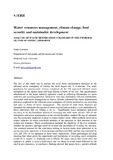Please use this identifier to cite or link to this item:
https://cris.library.msu.ac.zw//handle/11408/1316| Title: | Analysis of waste minimisation strategies in the informal sector of Gweru, Zimbabwe: paper presented at a conference held on the 14th-16th July 2015, Elephant Hills Resort, Victoria Fallls, Zimbabwe | Authors: | Jerie, Steven | Keywords: | Waste minimisation, re-use, recycling, informal sector, Gweru, Zimbabwe | Issue Date: | 2016 | Publisher: | Midlands State University | Series/Report no.: | Conference Proceedings; | Abstract: | The aim of this study was to analyse the solid waste minimisation strategies in the informal sector enterprises of Gweru, the third largest city in Zimbabwe. The study population for questionnaire surveys comprised all the 589 organised informal sector enterprises in the market areas and high density suburbs of the city. The questionnaire administered to the home industry operators aimed at collecting information on waste reduction and recycling practices. Interviews were also undertaken with key stakeholders concerned with waste management in Gweru. Results indicated that waste minimisation practices employed in the informal sector enterprises of Gweru involved re-use, recycling and sales as forms of waste management. The amount of solid waste disposed per enterprise far outweighs the amount of waste recycled and recycling is only undertaken by those enterprises that are willing to do so. Significantly more enterprises perceived recycling to be the friendliest method of managing the solid waste (almost 50% of the enterprises) and waste minimisation as the second friendliest method. Re-use of materials was the commonly employed strategy to source-reduce waste. Other methods involved in source reduction of waste considered attitudes of the operators in their decision to buy certain raw materials. These considerations included the durability of the raw materials, whether the products package could be re-used and possibility of re-using the products. The common reasons for the enterprises willing to recycle waste were perceived to be saving resources especially in Monomotapa and Shamrock Park and this was indicated by 81% and 76% of the operators in these areas respectively. These percentages are high showing that when given the opportunity and knowledge of recycling, most enterprises would do so keenly. At Kudzanai and in Mkoba the major reason that would drive the operators to prefer to recycle solid waste was the desire to avoid waste followed by the need to save resources. In conclusion, findings showed that people have a positive attitude and think it is important to recycle waste as a way of preserving the environment. In order to encourage citizens to participate, they need to be convinced of the importance of the service they are providing. A waste management plan is also essential for any settlement because waste needs to be managed at all stages from its generation to disposal. | Description: | Theme: 1st International Research Conference On Driving Socio-Economic Development Through Value Addition And Sustainable Use Of Resources Sub Theme: Water resources management, climate change, food security and sustainable development | URI: | http://hdl.handle.net/11408/1316 |
| Appears in Collections: | Conference Papers |
Show full item record
Page view(s)
276
checked on Feb 9, 2026
Download(s)
140
checked on Feb 9, 2026
Google ScholarTM
Check
Items in MSUIR are protected by copyright, with all rights reserved, unless otherwise indicated.




